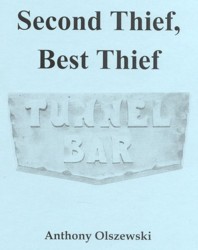 |  |  |
|
| ||
 |  |  |
 |  |  |
|
| ||
 |  |  |
|
|
|
Whelan and Flaherty decided to face the music. They pleaded guilty to income-tax evasion, received five-year concurrent sentences and $20,000 fines and went off to prison.
The five other defendants facing prison appealed. The Third Circuit Court of Appeals unanimously ruled against them: "The proof [of guilt] is overwhelming." The Supreme Court denied certiorari.
In the interim Stapleton had gone on trial in the state court, was found guilty of squandering the county's pension funds and was given a one-year to 18-month sentence, consecutive to the federal term.
One matter remained-the future of John V. Kenny.
A month after the Hudson County verdict, the Little Guy was hit with a new indictment-for what Manning might have described as a "federal resolution." Kenny and three others were charged with extorting a $20-million subcontract on the $40-million automated post office in Kearny. The investigation was handled by a Washington strike force; other than processing the papers, Stern's office had nothing to do with it.
Putting the post office in the Jersey swamps had been President Kennedy's reward for Kenny's support in the 1960 election. But what the Little Guy had done with the reward had been the subject of federal scrutiny under three administrations. "They weren't satisfied with having gotten the world's biggest automated postal facihty for Hudson County," said one Justice official, "they had to cannibalize it for `the boys downtown.'"
The indictment charged that Kenny had conspired to force the $20-million contract for construction of the plant to Kearny Associates, a firm headed by North Bergen mayor Angelo Sarubbi and John Luciani, and that "the boys downtown" had raked off $400,000 in cash from them. Kenny, Sarubbi, Luciani and a third contractor-Edward Hansenwere charged.
Meanwhile, Stem kept trying to get Kenny into court on the Hudson County case. For nine months the Little Guy successfully pleaded ill health, never venturing from his suite in Pollak Hospital.
Although his machine had been destroyed and he had announced his "retirement" from politics, there were indications that Kenny continued to pull strings in New Jersey -especially through Governor Cahill, who still owed the Democratic ex-boss an electoral debt from 1969.
In April 1972, Assemblyman David Friedland, a Democrat from Hudson County who claimed to be allied "privately" with reform-mayor Jordan, complained to Stern about Kenny's "continued interference" in legislative matters. Friedland, a former assembly minority leader, even suggested that the government tap a telephone in the State House to keep tabs on Kenny. Stem-who has not employed bugs in any corruption investigation-naturally declined.
Besides, the prosecutor was less interested in what Kenny was doing than in that he was doing it - that he was active politically and presumably fit to stand trial. From Friedland he obtained the names of three legislative colleagues who had also been in contact with Kenny. And from them he also secured affidavits as to Kenny's political activities. The Little Guy kept calling Trenton about congressional reapportionment, about the appointment of judges in Hudson County (whom Cahill duly named) and even about the choice of a Port Authority commissioner to replace the convicted Sternkopf.
Assemblyman Michael Esposito reported that Kenny had asked him, "Mike, how is everything in the legislature?"
"Quiet."
"Mike, keep it quiet."
But there was nothing to indicate that Kenny's activity was anything more than a political leader's normal concern for matters governmental.
"Did he ever ask you to do anything that was improper?" Kenny's counsel, Van Riper, asked Friedland at one court hearing.
"Not that I know of."
"Well, if it had been, you would have remembered that, wouldn't you, a moral man?"
"Mr. Van Riper, I don't know whether I am totally
moral or not, or whether you are or whether any man is." "I'm not, I'll tell you that," Van Riper said. "I try my best," Friedland replied.
Kenny came to court in a wheelchair on May 24 and escaped the ordeal of a trial by pleading guilty to six counts of income-tax evasion. Judge Shaw fined him $30,000 and sentenced him to 18 years in prison, pending a review. At Kenny's age it amounted to a life sentence. But Judge Shaw indicated that he would reduce the sentence once he received the prisoner's medical reports. The ailing ex-boss was remanded immediately to the federal prison hospital in Springfield, Missouri.
The bribery and extortion charges remained open, but Stern said the case would never be tried. "If the court wants to, it can keep him in jail for the rest of his life," he explained. "There is simply no point in bringing further prosecutions against an eighty-year-old man."
All along, the problem of Kenny's failing health had plagued the prosecutor. "When we didn't prosecute him, they said we were too soft. When we did prosecute him, they said we were too harsh. The truth is, he should have been prosecuted twenty years ago."
Kenny's review of sentence came on November 27. By then his physical condition had deteriorated sharply. In addition to his other ailments, he had undergone a prostatectomy, and, to keep his failing heart going, a pacemaker had been implanted in his chest. He was too ill even to come to court to hear his fate decided.
Judge Clarkson Fisher - who replaced the late Judge Shaw on the case - said that Kenny's crimes "warrant most serious penalties. However . . . I just don't feel it in my heart and mind to inflict any further cruelty." He reduced Kenny's sentence to 18 months, with the prospect of parole as soon as his physical condition warranted. Kenny was released on March 1, 1973, after a nine month sentence.
The Little Guy was free - but "a way of life" had ended in Hudson County.

|
|
| 08/18/2012 11:10 PM |
|
Computer Repair Blog XP Local Area Connection stuck at Acquiring Network Address |
 Your Ancestors' Story |
 Bruce Springsteen's Jersey Shore Rock Haven! |

|
UrbanTimes.com |